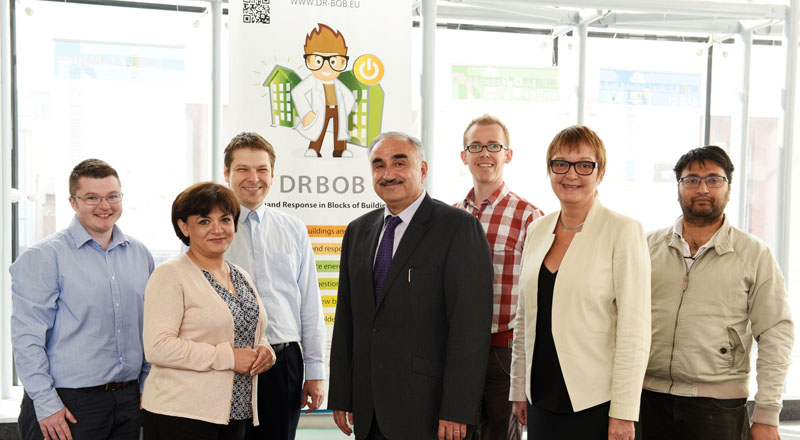University research could herald new energy management solutions
Teesside University is to lead a pioneering multi-million pound EU research project into how blocks of buildings can use intelligent electricity systems to maximise energy efficiency.

DR-BOB (Demand Response in Blocks of Buildings) is being headed up by the University’s Technology Futures Institute, and involves nine EU partners.
It will demonstrate the economic and environmental benefits of intelligent electricity systems in buildings which can adapt to fluctuations in demand.
The University will pilot a new energy management system which can adapt in real-time to levels of local energy production, consumption and storage, with the aim of saving money and minimising harmful emissions.
The DR-BOB solution will combine existing technologies to provide an innovative cloud-based central management system, supported by the real-time energy management solution which communicates with generation and storage systems in blocks of buildings.
This project aims to tackle inefficiency in energy systems caused by utility companies generating enough to meet large peaks in demand, most acute in the electricity sector, where energy cannot be easily stored. Utilities traditionally meet demand by controlling the rate of electricity generation, which is complicated by the introduction of renewable energy, which depends on variable weather conditions.
Demand response programmes which use electrical equipment more efficiently and can store energy within blocks of buildings have the potential to keep energy bills low and integrate renewables into energy networks.
Professor Nashwan Dawood, Director of the Technology Futures Institute within the School of Science & Engineering at Teesside University and coordinator of the DR-BOB project, said: 'We are delighted to head up this prestigious research project at Teesside University, working with other EU institutions to tackle this timely issue.
Trialling this innovative new approach to meeting electricity demand here on Teesside is a wonderful opportunity for our University to play its part in tackling the great energy challenges of the future.
'Trialling this innovative new approach to meeting electricity demand here on Teesside is a wonderful opportunity for our University to play its part in tackling the great energy challenges of the future.'
Dr Tracey Crosbie, the project dissemination manager, added: 'The DR-BOB project builds on our track record of successful international research funding. In particular a ground breaking EU project on demand response we led and delivered at the end of 2015.'
Dr Vladimir Vukovic was instrumental in the development of the project. He said: 'The project arises from the longstanding cooperation Teesside University has with a number of blue chip companies, such as Siemens UK, which is the key industry partner and technology provider in DR-BOB.'
Teesside University aims to become one of the country’s most environmentally-friendly institutions. The Curve, the £20m landmark teaching and learning building at the heart of its Middlesbrough campus, was recently rated 'Excellent’ under the BREEAM standard for its environmental quality and sustainability.
For more information on the DR-BoB project visit www.dr-bob.eu